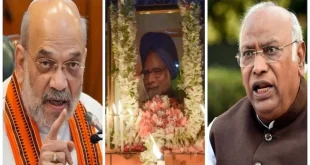While fighting for women's rights decades ago, our ancestors realized that personal laws based on religion in India do not give justice to women. Therefore changes should be made in these. After this, demands for making laws based on gender equality and changes in personal laws started rising. This issue was raised strongly during the Mahila Congress held in Poona in the year 1971 and the issue of gender equality and dignity of women got a boost.
In a way, we have been moving towards a uniform civil code for the last 150 years. Today in our country there are provisions for uniform civil code for all citizens, which were not there earlier. All communities have their own laws regarding inheritance, marriage, divorce and protection of children. It would be fair to say that they do not give proper rights to women. Since independence, women have been continuously challenging them. Since 1948, there have been many such occasions when the Supreme Court also advocated Uniform Civil Code and mentioned Article 44.
In the Shah Bano case in 1985, the Supreme Court said that it is sad that Article 44 of our Constitution has become useless. After this, in the Sarala Mudgal case of 1995, the Supreme Court asked that how much time would it take for the government to fulfill the wishes of the makers of the Constitution regarding Article 44 of the Constitution? In 2003, in the Jan Balavattam case, the court again said that it is a matter of regret that Article 44 of the Constitution has not yet been implemented.
This issue was also raised in the court during the Shayra Bano case in 2017. There is no doubt that the Uniform Civil Code advocates a progressive society, which should be implemented, but it has been seen that political parties have politicized it and made women disappear from the center of the issue. Instead of linking the need for Uniform Civil Code with justice, unity of the country, integrity, one country-one law, minority versus majority, the demand for reforms in the law has nothing to do with patriotism or unity, integrity. to do
Yet it became an issue to garner votes. Questioning personal laws came to be considered interference in religious matters. Women had to face a lot of trouble regarding this matter. They should know that women are not anyone's slaves. They are free and their voices should be heard. By initiating Uniform Civil Code in Uttarakhand, Chief Minister Pushkar Singh Dhami has completed one task included in the agenda of his government, but women are also asking him some questions regarding this law. It has been seen that women were neglected while making laws. Their situation was not considered.
Such laws can endanger the dignity of women as well as their safety. There is a possibility that in future more states will implement Uniform Civil Code. Therefore, they must consider whether the Uniform Civil Code model of Uttarakhand is in line with the opinion of the women of their state or not? When governments debate the draft Uniform Civil Code, they should ensure that the participation of women from all communities and the perspective of gender equality are at the center of the discussion.
This will make the fight for equality for women more effective. Besides, the pressure on governments and leaders to accept women's rights will also increase. It is hoped that states will not ignore the voice of women while drafting the Uniform Civil Code.
 look news india
look news india

